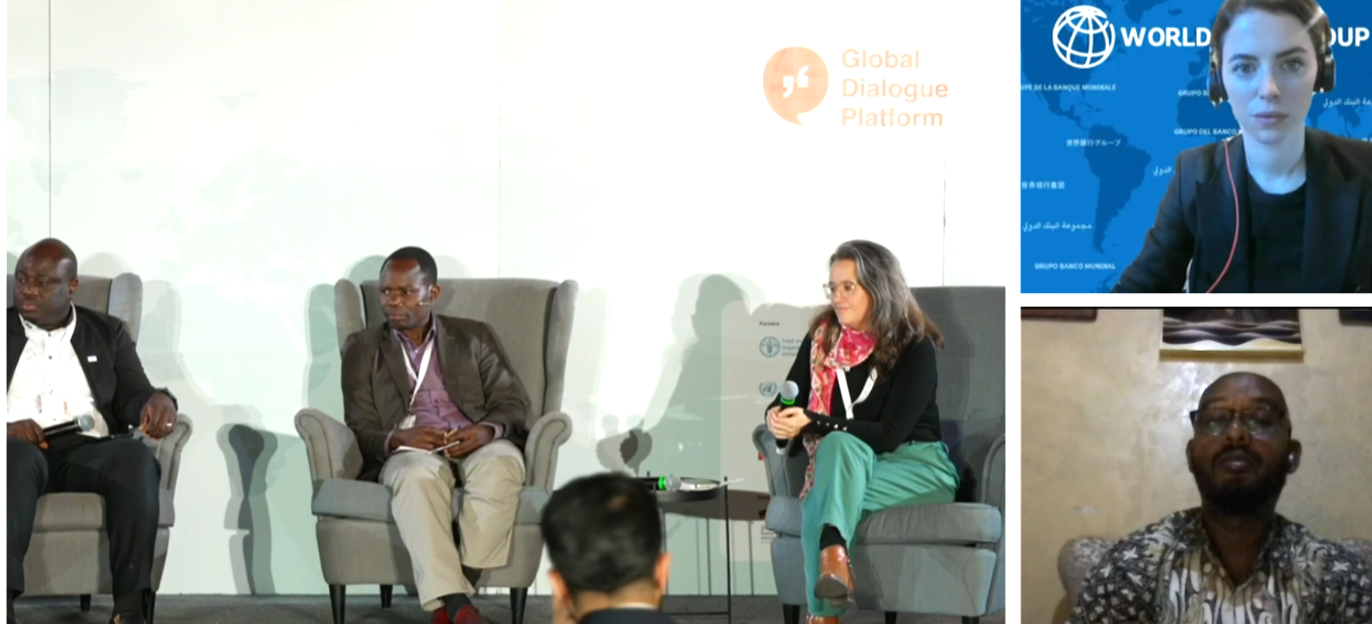[Event Recap] Government Fireside Chat at the 12th Global Dialogue Platform on Anticipatory Humanitarian Action

The 12th Global Dialogue Platform on Anticipatory Humanitarian Action, held from October 22 to 24, 2024, in Berlin and online, brought together experts to advance anticipatory action within disaster risk management systems. Centered on the theme, "Mainstreaming anticipatory action: collaboration in complex contexts," the event aimed to advance efforts to shift from reactive response to proactive, forecast-based action. On October 23, the Government Fireside Chat, a high-level sub-event, gathered national, regional, and global leaders to discuss embedding anticipatory action in complex contexts. Moderated by Catalina Jaime (Head of Climate and Conflict, Red Cross Climate Centre), the session featured speakers Khadar Sh. Mohamed Nur (Director of. Disaster Risk Management, Somalia Disaster Management Agency [SODMA]), George Otieno (Thematic Lead for Anticipatory Action, Intergovernmental Authority on Development [IGAD]), Bianca Adam (Senior Financial Sector Specialist, World Bank), and Tobi Salawu (Director of Programme, Christian Rural and Urban Development Association of Nigeria [CRUDAN]).
The discussion delved into the following topics:
1. Mainstreaming Anticipatory Action at National and Regional Levels
George Otieno shared how IGAD’s regional coordination model unites countries with shared challenges to foster joint problem-solving. He emphasized that this collaborative structure, especially among countries like Sudan and Ethiopia, allows regional actors to address complex issues collectively, promoting trust-building and sustainable coordination.
2. Insights from Nigeria: Institutional and Funding Challenges
Toby Salawu discussed how weak institutional frameworks and reactive government priorities in Nigeria create barriers to anticipatory action. Local agencies often lack the capacity for early warning integration, and funds are typically directed to reactive rather than preventive measures. Toby noted that economic and political interests sometimes overshadow anticipatory funding, complicating support for proactive approaches. Additionally, fragmented coordination among national and local actors remains a challenge despite efforts by task forces to bridge gaps.
3. Somalia’s Progress and Future Vision for Anticipatory Action
Khadar Sh. Mohamed Nur highlighted Somalia’s strides in making anticipatory action a national priority. Somalia’s Early Warning for Early Action initiative, launched in 2023 with support from the Green Climate Fund, covers five regions with a roadmap to 2027, demonstrating a shift towards proactive disaster management. The initiative includes specific early warning triggers and thresholds, supported by regional partnerships, to help Somalia move from reactive responses to proactive risk management. However, he noted that inter-agency coordination remains a challenge. To address this, Somalia is also exploring ways to leverage resources from the private sector and diaspora communities. Khadar discussed Somalia’s shift from a National Development Plan to a Somalia Transformation Plan, which emphasizes sustainable growth in sectors like agriculture and fisheries. Through this plan, the government aims to safeguard investments from disaster impacts by incorporating anticipatory action, thereby reducing reliance on reactive humanitarian assistance.
4. The Role of Financial Institutions in Enhancing Early Warning Systems
Bianca Adam emphasized the World Bank’s commitment to proactive disaster response, with 80% of its disaster risk management investments now focused on ex-ante interventions. From the Bank’s perspective, she emphasized three areas of support: bringing finance ministries into discussions on anticipatory action, leveraging national systems (such as social protection frameworks), and advocating for comprehensive disaster risk finance strategies. These strategies help address needs across the continuum from early action to reconstruction. Bianca stressed the importance of tailoring responses to each context, recognizing that there is a wide range of FCV settings with unique challenges that require specific solutions and a deep understanding of the political economy context.
5. Collaborative Compound and Complex Risk Analysis
A key discussion point was the need for complex risk analysis, especially in fragile areas. Toby noted that anticipatory action should account for multiple interacting hazards, while Bianca highlighted the importance of interdisciplinary collaboration across disaster risk management, climate science, and finance to fully understand and address root drivers of fragility. Initiatives like the Global Shield Against Risks facilitate this collaboration by bringing diverse expertise together.
Key Takeaways
- Regional and Cross-Sector Coordination is Essential
Effective anticipatory action relies on strong coordination across regional and sectoral lines, fostering collective problem-solving and enabling a unified disaster preparedness approach. - Strengthening Institutional Frameworks and Securing Funding
Robust institutional support and sufficient funding are crucial to transition from reactive responses to proactive anticipatory systems. Investments in capacity-building and leadership engagement are essential. - Incorporating Anticipatory Action into Development Planning
Embedding anticipatory action in national and development planning helps safeguard investments and reduces dependence on humanitarian aid by addressing risks before they escalate. - Economic Justification for Anticipatory Action
Financial institutions play a key role in demonstrating the economic value of proactive disaster measures, helping bring finance ministries into discussions to support anticipatory financing within broader national strategies. - Comprehensive Risk Analysis for Informed Decision-Making
Effective anticipatory action requires an understanding of multiple, intersecting risks. Interdisciplinary collaboration is vital to ensure resources are allocated impactfully, especially in high-risk contexts.
The discussions highlighted that by uniting expertise across humanitarian, development, and financial sectors, anticipatory action can better address the growing challenges posed by climate and disaster risks.
Watch a recording of the event here.